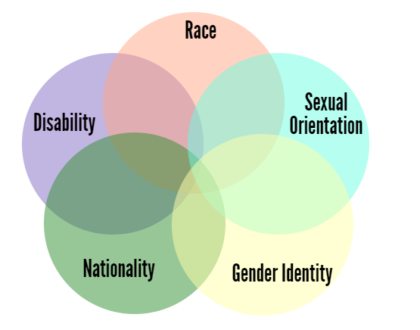What exactly is intersectionality, you might be wondering? Intersectionality is a sociological framework used to understand the social and political identities of an individual and a group when discussing race, class, gender, sexuality, and, most recently, disability. This theoretical framework stems from critical race theory and feminist studies in the 90s to describe how these social categorizations can overlap. Furthermore, intersectionality suggests that these categories are interconnected and, therefore, cannot be examined separately from one another as it results in a culmination of unique and specific experiences of discrimination and privilege.

Growing up as a white, middle-class, queer, and disabled cis-gender male, I’m fortunate to say that I have had a privileged life with a handful of discriminatory incidents. More specifically, growing up in Newfoundland with these social and political identities, I have never thought about or been taught that these personal identifiers intersect with one another. This is not to say that I was forced to suppress these aspects of myself (particularly the queer and disabled aspects). Still, I was never told to think critically about these characteristics and what they mean on an individual or group level (groups being the queer or disabled communities).
I invite you to think about when you learned about the intersection of social and political identities of people. How long ago or recent was this? Did you learn about it on your own or in a classroom setting?
Despite being around since the 90s, I, unfortunately, never learned about critical race theory or feminist theories until I was nearing the end of my Bachelor of Arts degree here at Memorial. As a Doctoral student, I would argue that both should be included in many academic spheres as a way of deterring acts of discrimination against marginalized groups. The development of these two theories and the progression of academia have brought about other notable social theories, such as Black feminism, post-structuralism, Queer theory, postcolonialism, and, most recently, critical disability theory as well.
When I went to the United Kingdom to complete my master’s degree, I witnessed the firsthand application of intersectionality to academic studies. My friends studying Classics were applying intersectional theories to the research and analysis of classical works of art from ancient Greece and Rome, arguing that current understandings about stories behind select art pieces may not be as straightforward as researchers once thought. This made me think about how it is essential to question and challenge established narratives to explore new perspectives, uncover overlooked stories, highlight marginalized voices, and correct misconceptions. This is truly what it means to bring intersectionality into academic spheres.
So, who or what is at the crossroads of intersectionality? I think that it is you! You and the characteristics that define your social and political identifiers are all interconnected. Being at the crossroads could mean that you are reflecting on how these identifiers impact your perspectives, experiences, opportunities, and interactions with the world around you. These further help shape your beliefs and values of the world as well. Moreover, all of this prompts you to become introspective by placing yourself in the shoes of others and becoming aware of social justice issues. The crossroads of intersectionality further invites you to consider how systems of power and oppression intersect with individual identities.